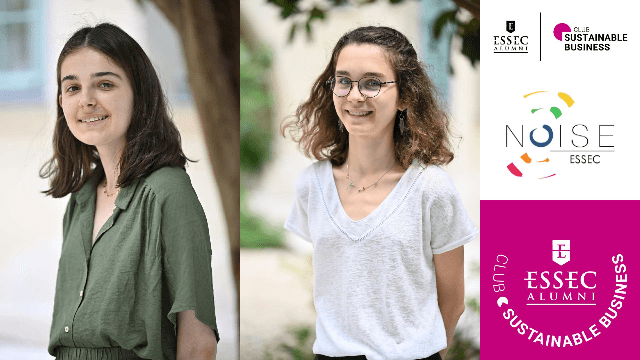#1Mois1Engagé : Jeanne Rodriguez E(25) and Léa Duranceau E(25) ""Making the transition a collective project, not a catchword".
07.28.2025
After two years in the B/L preparatory program, Jeanne joined ESSEC. With a Bachelor's degree in Economics, she now seeks to specialise in ecological transition. Next year, she will deepen her understanding of these issues at Bocconi University as part of a double-degree program. Her first internship was at the General Commission for Sustainable Development within the French Ministry for the Ecological Transition. Jeanne has also been involved with the NOISE association—first as a member and then as head of the consulting division, where she collaborated with local organisations such as Agir Local and O’Watt Citoyen as well as the events and journalism team.
Léa joined ESSEC’s Grande École program after two years of ECG preparatory classes in Bordeaux. She later entered Bocconi University as part of a double-degree program to deepen her knowledge in CSR and ecological transition financing. She is particularly interested in environmental issues, mainly marine biodiversity conservation. At NOISE ESSEC, she co-led the events and journalism team and oversaw two consulting missions supporting Agir Local.
ESB: What’s your background, and what led you to focus on CSR-related topics?
Jeanne: I began taking a close interest in climate change and its impacts during high school. In prep school, I discovered economics, and since then, I’ve been fascinated by the challenge of aligning our socio-economic model with planetary boundaries.
Léa: Growing up by the sea made me aware of ocean pollution and the importance of preserving marine biodiversity early on. I started to question my lifestyle and began what some might call an “environmental transition” while still in middle school. My convictions deepened in high school and prep school, where I explored these topics further and realised their complexity.
ESB: What does CSR look like in your daily life?
Jeanne: Beyond CSR, environmental issues deeply guide my personal and professional choices. My first internship at the General Commission for Sustainable Development (CGDD) within the Ministry for the Ecological Transition was an immersion in public sector sustainability—CSR from the perspective of public administration rather than the private sector!
Léa: These topics are now fully integrated into my daily life, personally and professionally. Beyond my involvement in student organisations, I specialise in ecological transition and working in that sector. I explored the public policy side during an internship at the Ministry for the Ecological Transition.
Jeanne and Léa: We’ve been active NOISE members for the past two years. This year, we co-led the events and journalism team. Our goal was to raise awareness among students, ESSEC staff, and residents in Cergy on environmental issues. During the 2024–2025 academic year, we organised a debate and three conferences, welcoming inspiring speakers, including:
Jean Jouzel (climatologist and IPCC expert)
Esther Crauser-Delbourg (water economist and founder of the consulting firm WaterWiser)
Jézabel Couppey-Soubeyran, Jean Pisani-Ferry, and Frédérik Jobert (economists and senior officials working on ecological planning)
This experience was enriching—it helped us deepen our knowledge, engage with inspiring speakers, and collaborate as part of a motivated and committed student team.
ESB: How would you define CSR?
Jeanne and Léa: In an interview, Fabrice Bonnifet—our second guest speaker of the year—described his CSR work at Bouygues: “We try to reinvent the way we build.” While he referred to Bouygues’ core business, we like to interpret this more broadly: CSR is about inventing and implementing new, more sustainable ways of operating so that every company can contribute to a desirable and sustainable future.
As Bonnifet emphasises in the collective work "101 Words on Corporate Social Responsibility for Everyone", CSR isn’t a rigid or standardised concept—it’s a dynamic framework. This compass helps reimagine practices that may have become outdated or harmful.
ESB: Any final thoughts for the ESSEC Alumni and the Sustainable Business Club?
Jeanne: We can all take action—whether on an individual level or through collective engagement in associations or our professional lives. I’m convinced that sharing experiences is an incredible source of inspiration and motivation. Many thanks to the ESSEC Sustainable Business Club for its initiatives—I look forward to connecting with some of you soon!
Léa: CSR and ecological transition are no longer niche topics; they’re now present across every area of society. Each of us has a role to play, and only by working together and sharing our diverse knowledge and skills can we address these critical challenges. The ecological transition is a collective effort, and initiatives like the ESSEC Sustainable Business Club are a testament to that.

Comments0
Please log in to see or add a comment
Suggested Articles




